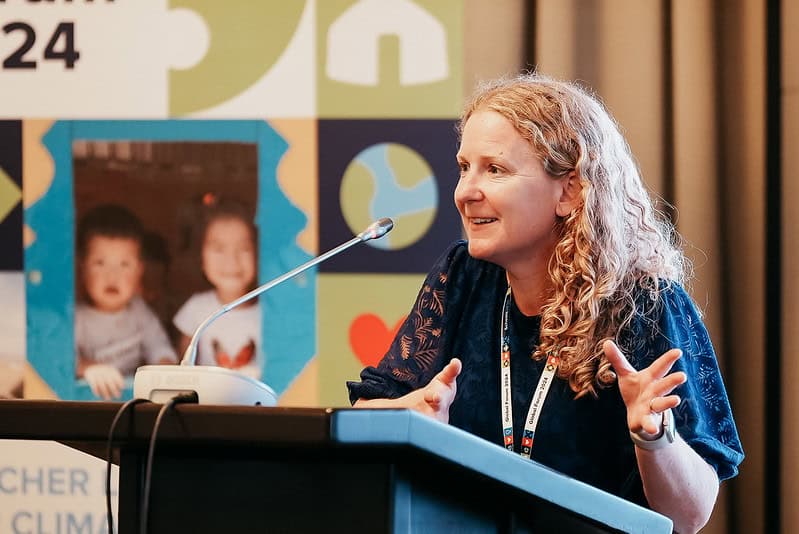Each year in June, Schools2030 hosts its annual education event in a different programme country. Fresh off the back of a third successful event in the Kyrgyz Republic, Dr Bronwen Magrath (Schools2030’s Global Programme Manager) shares her insights on the third Schools2030 Global Forum – who was there, what happened and, importantly, why are the Schools2030 Global Forums so important to the programme and its broad goals.
Thank you for joining us Bronwen and congratulations on hosting another successful Schools2030 Global Forum! This is the 3rd Global Forum the Schools2030 programme has held. Can you tell us a little about the purpose of the Forums? How do they work and why are they important to your goals?
Thanks so much Sarah and thank you for this opportunity to talk about the Schools2030 Global Forum! It was a very busy week in Bishkek and it is nice to be able to reflect a bit on the successes we had and the role of the Schools2030 Global Forum within our wider programme and education strategy.
As you know, one of the three ultimate outcomes of the Schools2030 programme, which are captured in our theory of change, is that teachers are recognised as experts and leaders in education innovation and are actively engaged in education sector dialogue. The Schools2030 Global Forum plays a central role in helping us realise this outcome, as it is an opportunity for teachers from across all programme countries to come together with other education leaders – government, donors, academics, international organisations – in order to share their best practices and expertise and to engage in meaningful dialogue.
So this year’s Schools2030 Global Forum saw over 200 international education experts and leaders from around the world – including 25 teachers – gather to discuss the pressing theme of climate education and the role of teacher leadership in fostering climate resilience. All of the teachers presented their innovative practices and approaches to climate education, providing delegates with practical, classroom-based actions to respond to local priorities on climate and sustainable development.
But although these example innovations are important and inspirational, the “big picture” of having teachers present their work is much more than just providing examples of classroom practices that can be adapted and adopted more widely. The Schools2030 Global Forum provides proof that teachers are innovators and must be in the drivers’ seat of the education sector’s response to the climate emergency.
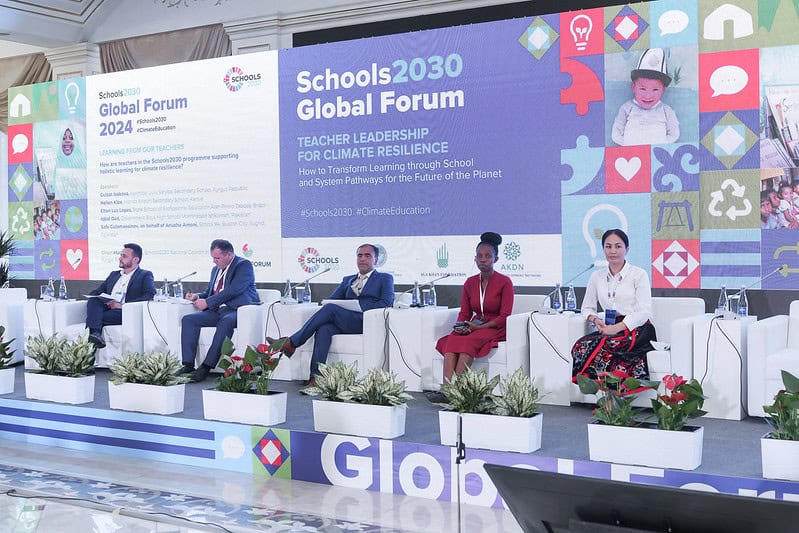
This year, the Schools2030 Global Forum was hosted in the Kyrgyz Republic. What was different about the event this year compared to previous years?
Each year, the Schools2030 Global Forum is as an opportunity to showcase the cultures and traditions of the host country. And this year was no different – we were treated to some really beautiful glimpses of the diversity of Kyrgyz culture. This included very beautiful musical performances from the Aga Khan Music Programme and from students from General Secondary School 69 in Bishkek, as well as an evening of music and dance at the Kyrgyz National Opera and Ballet Theatre. Our team in Kyrgyzstan also worked with teachers and community members to set up several yurts in the conference grounds, and within these yurts, teachers and others from across the programme displayed both some of the physical learning materials they use at their schools as well as demonstrated how to make traditional Kyrgyz handicrafts including home furnishing materials, jewellery and other beautiful artisanal items. This was a new and wonderful treat for delegates that really opened up the country’s heritage to a global audience!
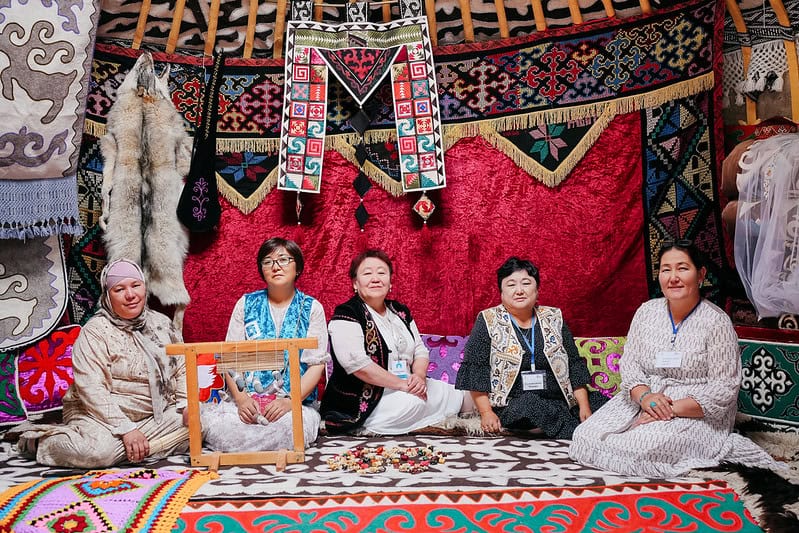
This year our partnership with the Ministry of Education and Science (MoES) of the Kyrgyz Republic really made the event very special. Of course, we have always been co-hosted and worked in partnership with the Ministry of Education of the host country, but this year – in part as a celebration of their 100-year anniversary – the Kyrgyz MoES opened their doors to us quite literally by hosting the first day of the Forum at the stunning Ala Archa State Residence. Apart from being a very elegant and historic venue, this also allowed us a degree of engagement with Ministries that we have never had before. The day included a Ministerial Roundtable with representatives of Ministries of Education from nearly all programme countries present, together with teachers from these countries. This opportunity for deep engagement between policymakers and practitioners from across the globe was moving and a very powerful testament to the importance of inclusive sector dialogue.
“The first day included a Ministerial Roundtable with representatives of Ministries of Education from nearly all programme countries present, together with teachers from these countries. This opportunity for deep engagement between policymakers and practitioners from across the globe was moving and a very powerful testament to the importance of inclusive sector dialogue.”
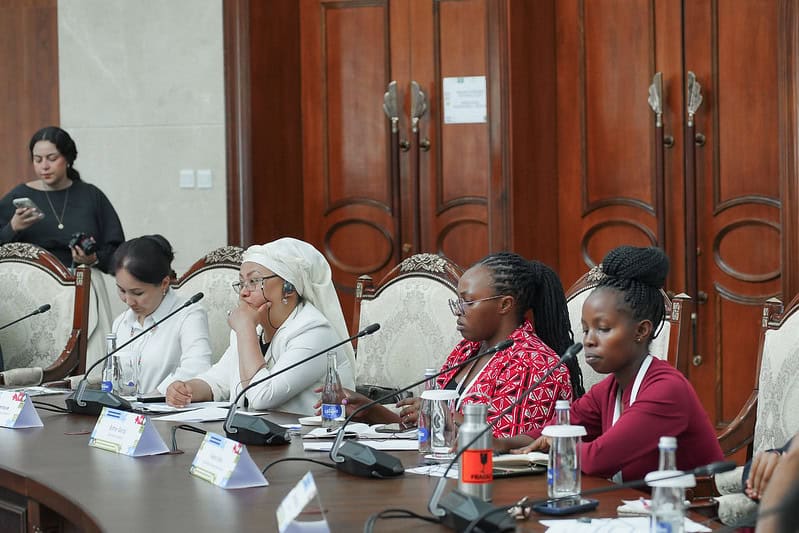
This year the Forum’s theme was Teacher Leadership for Climate Resilience. How does the programme work to support a climate education agenda?
First just a reminder about the core model of the Schools2030 programme – Assess, Innovate, Showcase – which supports teachers to measure what matters and to design contextualised innovations and classroom practices that meet student needs – and then of course to share these more widely through showcasing events and other communication channels.
The contextual reality in all our countries is one of changing climate, and teachers and students are living this daily whether it is in enduring extreme heat or navigating devastating floods. In all cases we are seeing education disrupted by changes to climate and more severe weather.
Schools2030’s Three-Step model supports teachers to develop classroom innovations and practices that focus on climate adaptation as well as developing young people’s understanding of climate change and sustainable development. But of course, we recognise that teachers and students need examples and “play books” of climate-focused education innovations. Schools2030 is building off important partnerships, including with Teachers for the Planet, an initiative of AKF and Teach for All, as well as CO-CREATE, a project with multiple partners in Tanzania focused on the intersections of climate gender and education. We were also delighted to have teachers and colleagues from UNESCO Greening Education Partnership in Central Asia attend the Schools2030 Global Forum to share some of their approaches to education for sustainable development. Through these initiatives we are building a repertoire of climate-focused classroom practices that can be adapted and adopted across and beyond the Schools2030 programme.
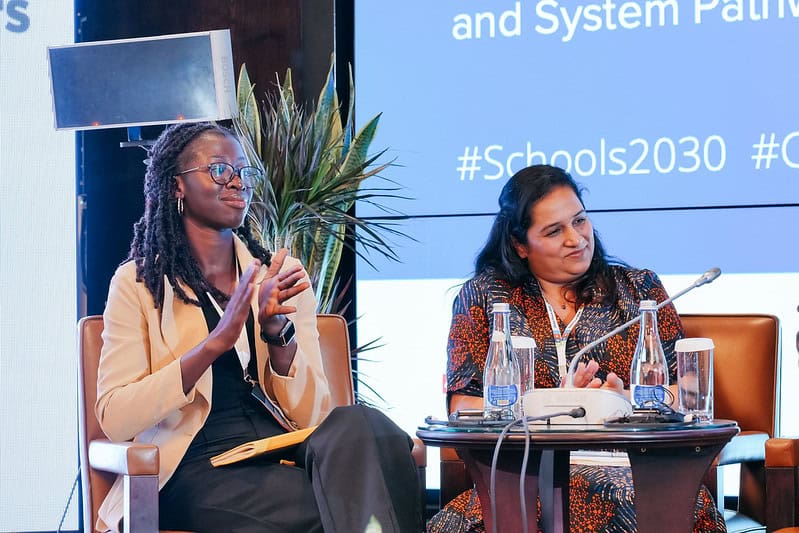
Next year, the Schools2030 Global Forum will be hosted in Kenya. What are you hoping to achieve in that country? Can you give us any hints as to what the Forum next year will focus on?
We know that our focus will remain on teachers and teacher leadership, likely zooming into a few key components of teacher professional development and driving home our central message on the value of teacher agency and responsive pedagogy.
As always we will work closely with the Ministry of Education in Kenya to select a topic that is relevant to sector priorities. We know in Kenya that professional development of teachers is high on the agenda, particularly with the introduction of the competency-based curriculum. We plan to release a Save the Date and theme announcement in September so watch this space!
Very exciting! We will look forward to learning more in due course. Is there anything else you would like to add regarding the Schools2030 Global Forums?
2024 is a watershed year for the Schools2030 programme as we move into Phase 2. Over the next three years, we will be building from the foundations we laid in Phase 1 which focused on the development of Schools2030 tools, models and innovations to now think about how we scale the impact of these more widely beyond our programme schools. The Schools2030 Global Forum plays an important role helping us move from school-level innovation to system-level change.
Over the past three Global Forums, we have seen tremendous growth in the capacities and capabilities of our teams and of the teachers we work with and a growing recognition of teachers as innovators. We are now building together an evidence base on the importance of holistic learning and teacher agency, and the Global Forum allows us to shine a light on this evidence and really contribute to a mindset shift on the role of teachers in education sector dialogue. This is not just about replicating and scaling Schools2030 tools and innovations; it is about supporting an enabling environment that allows innovation to flourish in our classrooms and education systems.
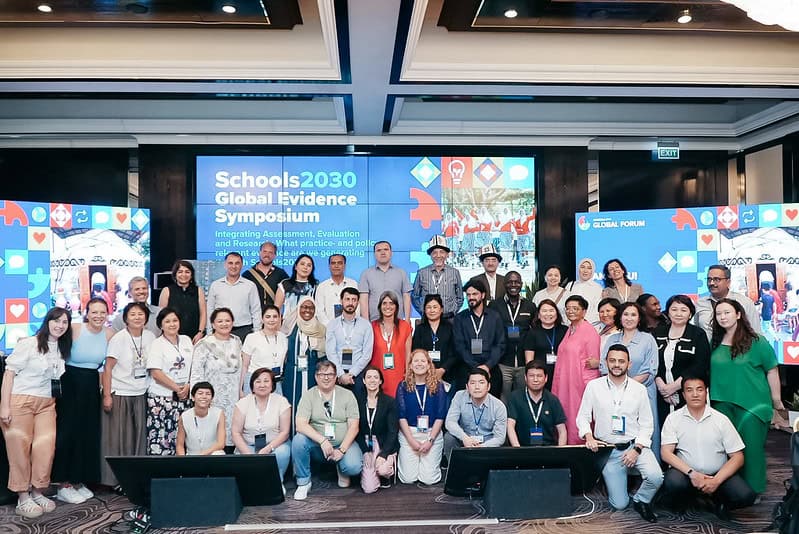
Browse the session learnings, photo galleries and more from this year’s Schools2030 Global Forum.
